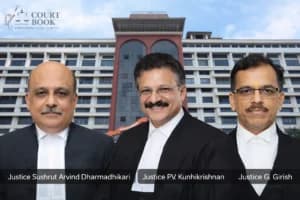The Indian Supreme Court on June 26 issued notice in a special leave petition (SLP) filed by the State of Karnataka challenging the Karnataka High Court judgment quashing arrests under the Indian Penal Code (IPC) for not supplying written grounds of arrest.
A bench of Justices KV Vishwanathan and NK Singh said the legal question - whether the Pankaj Bansal vs Union of India judgment, which mandates the grounds of arrest by the Enforcement Directorate (ED) to be written down, applies retrospectively - can be addressed in the forthcoming judgment in Mihir Rajesh Shah vs State of Maharashtra, where the judgment has been reserved.
"If 'hereinafter' means that the judgment should be given for the future, how did they quash the arrest in Bansal? 'Hereinafter' can only mean that it is a warning to you," Justice Vishwanathan said, implying that the retrospective nature of Bansal may still be relevant.
Read also: Supreme Court to Hear Plea Against Maratha Reservation in July
The Karnataka High Court in its order dated April 17, 2025, had quashed the remand of a murder accused on the ground that he was not informed about the reasons for his arrest in writing. The High Court relied on Pankaj Bansal, interpreting the ED arrest rules to apply to IPC offences as well.
However, senior advocate Sidharth Luthra, appearing for the state, argued that the Bansal judgment delivered on October 3, 2023 is clearly intended to apply only to future cases.
Luthra, citing the Pankaj Bansal judgment, said, "It would henceforth be necessary that a copy of such written grounds of arrest be given to the arrested person as a matter of course and without any exception."
Read also: NEET-PG 2024: Petition in Supreme Court Against Conversion of Chandigarh UT Quota to All India
He further cited Ram Kishore Arora vs ED, where the Supreme Court had clarified that Pankaj Bansal does not have retrospective effect. Luthra expressed concern that the High Court's interpretation could open the floodgates, affecting several pending cases.
Despite the arguments, the Supreme Court did not accept Luthra's request that the High Court judgment should not be seen as a precedent.
"Our attention is also invited to the order dated 22.04.2025 passed in SLP (CRL) No. 17132/2024. The outcome of the judgment will have a bearing on taking a final decision on this matter…List the matter on July 18," the bench ordered.
Background of the case:
The respondent was arrested in March 2023 under Sections 302 and 201 of the IPC. Though the authorities claim that the reasons and memos for arrest were served, the high court said that no meaningful details were given to the accused "as soon as possible", nor was written communication given as required by evolved jurisprudence.
Read also: Supreme Court Refuses to Grant Bail to PFI Leader AS Ismail on Medical Grounds, Seeks Report on
The high court highlighted that under Prabir Purkayastha vs State (NCT Delhi) and Vihaan Kumar vs State of Haryana, non-serving of written grounds of arrest has become a significant legal defect from a procedural lapse.
"Any violation of procedural fairness, in particular, the violation of entrenched fundamental rights, makes the arrest wrongful, leading to continued imprisonment…violating Articles 13(2), 21 and 22(1) of the Constitution," the high court said.
Karnataka, fearing that this precedent would jeopardise many cases, approached the main court. Now, all eyes are on the Supreme Court's pending verdict in the Mihir Shah case, which may bring much-needed clarity on Bansal's retrospective application and its applicability beyond ED arrests.
Case Title: STATE OF KARNATAKA BY ARASIKERE TOWN POLICE STATION Versus HEMANTH DATTA @ HEMANTHA @ BABY AND ANR | SLP (Cal) 9295/2025














